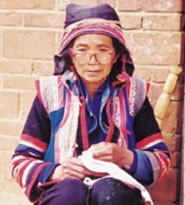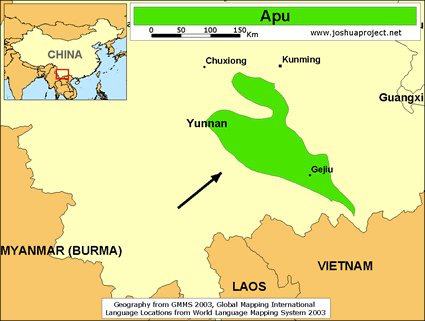The Apu are one of 120 distinct tribes and groups of Yi in China that have been officially combined into the Yi nationality. This great number of groups is the result of war, migrations, and the threat of slavery over the course of many centuries. Conflict has caused small groups like the Apu to leave their homes and move away to more peaceful settings. After being isolated for generations, the Apu developed their own customs, identity and dialect.
The Apu were only "discovered" in the past few years. Apart from the fact that they have been officially included as part of the Yi nationality by the Chinese government, we know little about the Apu.
Yi groups in China celebrate weddings in various ways. An observer recounted how one ceremony took place "on a day chosen in consultation with a shaman for its auspiciousness as determined by its conjunction with the couple's birthdates and those of their parents. The men of the groom's party are greeted by the women of the bride's family, first with witty remarks, then with buckets of water; their faces may be smeared with pepper and soot, and some girls even physically attack them. Once the ice has been broken, the pig and other ingredients for the marriage feast are prepared. After the feast, the bride is taken to the groom's home, with much weeping and protestation. For three to five days the bride remains at the groom's parents' home, during which time the groom and bride are separated. The bride then returns to her parents' home for a 'waiting-at-home-period' that may last for one or two years or until she is pregnant. During this time, the bride takes lovers - often cousins - and the groom must not only bring presents if he wishes to have sexual intercourse with her but must usually use force to do so. This is a probationary period, which allows both parties to reconsider the match and allows the woman to prove her childbearing abilities."
The Apu worship a host of spirits that they believe control the life of their communities. These spirits include an honored dragon god.
The Apu are a people group in dire need of the gospel. Alcoholism and sexual immorality have affected the Apu so that few adults do not live in bondage to one or both of these. Although many Hmong and Iu Mien living in Jinping County have come to faith in Christ in recent years through gospel radio broadcasts in their languages, they live some distance away from the Apu and have little contact with them.
The Apu people need to submit to Jesus Christ so they can experience the abundant life he offers them in John 10:10.
Pray for the authority of Christ to bind hindering spiritual forces to lead them from darkness to light.
Pray for signs and wonders to happen among them and for great breakthroughs with a rapid multiplication of disciples and house churches.
Pray for bold workers who are driven by the love of the Holy Spirit to go to them.
Pray for an unstoppable movement to Christ among them.
Scripture Prayers for the Apu in China.
Operation China, Asia Harvest, Copyrighted © Used with permission
| Profile Source: Joshua Project |











